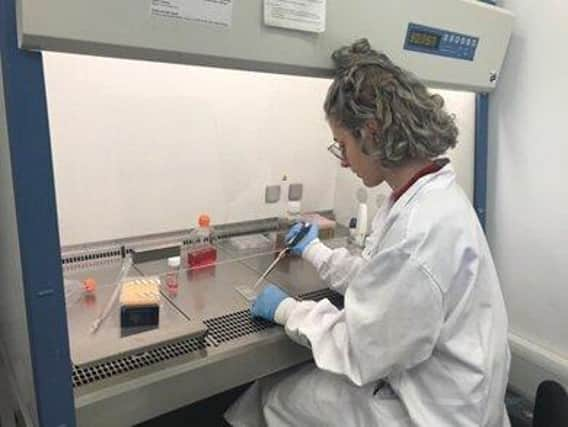HORIBA UK from Northampton joins national coalition to help reduce animal testing


Northampton-based HORIBA UK has joined a national coalition of scientists training the next generation to reduce animal testing.
The lifETIME (Engineered Tissues for Discovery, Industry and Medicine) CDT is a partnership between the University of Glasgow, University of Birmingham, Aston University and CÚRAM – Science Foundation Ireland at the National University of Ireland, Galway.
Advertisement
Hide AdAdvertisement
Hide AdThe partnership offers fully funded PhD studentships focusing on training across a range of scientific disciplines to enable research students to develop non-animal technologies (NATs) that better mimic physiology and disease.
In partnership with industry, the lifETIME CDT harnesses knowledge-exchange and co-creation in pioneering science to develop bioengineered humanised 3D models, microfluidics, diagnostics and sensing platforms. As an industry partner, HORIBA will co-create, support and mentor a four-year research project to explore how spectroscopy can help drive new methods of cell screening and disease diagnosis based on animal-free research.
In addition to supporting leading research, industry partners such as HORIBA also enable students to experience different industrial roles and strengthen their multidisciplinary skills to guide their future career choice. Not only in academic research, but also marketing, regulation, standards, or policy. This provides student cohorts with the professional skills training needed to ultimately enhance industrial and societal impact.
Dr Simon FitzGerald, technical manager for HORIBA UK said: “Our involvement with doctoral training centres keeps us close to cutting-edge UK science, and allows us to give something back through support and nurture of a new generation of scientists.
Advertisement
Hide AdAdvertisement
Hide Ad“We are particularly excited to join lifETIME CDT as we can enable and contribute to incredible science that will drive real improvements in disease diagnosis, medicine and clinical science.
"It covers a broad range of research driven by world-leading scientists, much of which is underpinned by the spectroscopy and measurement technologies that are at the core of HORIBA’s expertise. HORIBA and the lifETIME CDT is a perfect synergy.”
Matthew Dalby, Professor of Cell Engineering at the University of Glasgow, and director of the lifETIME CDT, added: “HORIBA will work with lifETIME to make our models a reality, to reduce and replace the need for animal testing and to offer new skills to our PhD students.
"The opportunities that this partnership brings are huge – HORIBA’s expertise in spectroscopic and analytical science will be of great benefit for our students and the science they do.
Advertisement
Hide AdAdvertisement
Hide Ad"The involvement of industry really helps us to deliver enhanced training and opportunities to our students. HORIBA, and our other partner companies, are critical to our success.”
The CDT partnership also facilitates wider networking opportunities between industry partners and the many leading academics involved. This supports the discovery of potential synergies between HORIBA and major research institutions to help identify and develop future technologies for further scientific advancements.
HORIBA is already an industry partner with a number of other academic institutions, including the ReNU Centre for Doctoral Training which is focused on another HORIBA core market, energy.
Other active scientific partnerships include those with the University of Southampton (photonics), University of York, King’s College London and Guy’s Hospital (spectroscopy for disease diagnosis), Northumbria University (novel materials for display technology), Cell and Gene Therapy Catapult, and CPACT (Centre for Process Analytics and Control Technology).
Readers can learn more about HORIBA UK on its website.